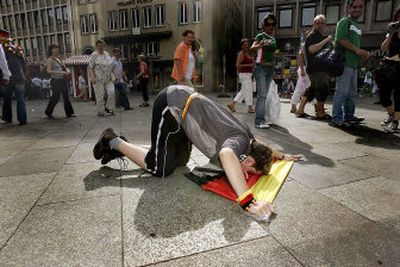World Cup kick-starts Germans’ pride

BERLIN – Michaela Schwingler, who was painting a German flag on her son’s face in the middle of a crowd of tens of thousands of Germans wearing black, red and gold flags and outfits, remembers when such a display of pride would have sent shivers of fear down her spine.
“Only last month, I was standing in a store looking at the shirts for the different national teams, and I couldn’t bring myself to buy a German shirt,” said Schwingler, who’s 41. “It seemed so wrong, to be proud of Germany. The world is watching us for such signs. This is something I would never have believed could happen here.”
Since the fall of Adolf Hitler and the Third Reich and subsequent understanding of the details and extent of the Holocaust, in which 11 million noncombatants, including 6 million Jews, were killed, signs of patriotism in Germany have been seen as signs of the resurgence of a dark piece of its history. In fact, to Germans the simple phrase “I’m proud to be German” is considered a neo-Nazi statement. The German National Party, a far-right party, once issued stickers containing the phrase.
But in the past two weeks, since the World Cup soccer tournament opened in Munich with an unabashed display of German culture, Germans have done something forbidden to them for more than 60 years: celebrated their country.
More and more Germans are wearing their national soccer-team jerseys. Flag sellers are reporting a tenfold increase in sales, with car-mounted flags making their first appearance here.
Newspapers are asking whether these are signs that the World Cup is forging a new German nation. “How much Germany can we take?” Berlin’s hip entertainment magazine Tip asked on a cover that consisted of a German flag. The German newsmagazine Focus called it “The hour of the patriots.” Der Spiegel, Germany’s most influential magazine, ran a cover with the words “The Germany Party” and an 11-page story titled “Germany, a Summer Tale.”
“It’s like being in a different country,” the story noted, “with Mediterranean cheerfulness and uninhibited, open-minded patriotism. … A country under a black-red-and-gold blanket.”
Wolfgang Munchberger, 64, noted that it’s about time. He was wearing a German soccer-team uniform – shirt and shorts – and holding a German flag in one hand and a cup of German beer in the other.
“Must the grandchildren pay for the sins of their grandparents?” he asked, waiting patiently at a traffic-less street for a green light. Germans don’t cross against a light. “A person should be able to put a flag on their car and sing the national anthem without being labeled a Nazi.”
There’s still considerable hand-wringing. The National Teachers Union has prepared a brochure warning against singing the national anthem, with its nationalist, superior themes. The first verse is illegal to sing because of its association with Hitler.
Andrei Markovitz, a University of Michigan political scientist who’s now at Dortmund University as a “soccer professor,” notes that he’s been in frequent debates with “the chattering classes” about whether this patriotism is healthy.
“People are worried a show of national pride will make Germany more open to an extension of nationalism and that will lead back to the bad old days,” he said. “It won’t. It’s harmless, it’s probably healthy and it will probably end as soon as Germany loses a game or the tournament ends.”
Thomas Bauer, a research fellow at Munich’s Center for Applied Policy Research, doesn’t see anything sinister in what’s happening.
“Germans are simply learning how to celebrate their flag and their national anthem,” he said. “This couldn’t have happened before.”
The last time Germany celebrated itself this way was in 1989, when the Berlin Wall fell and the country long divided between East and West was reunited. Then, however, displays of national pride were officially frowned on and discouraged. Not now.
Manfred Goertemaker, professor of recent German history at Potsdam University, said the celebrations marked an important change in the German psyche. He noted that Germany won World Cups in 1954, 1974 and 1990, but there were no similar displays.
“A lot had to change here to make us ready for this moment,” he said. “We’ve reconnected to the world; we even have troops in Afghanistan and Kosovo. Politically, culturally, economically, I just think we’re ready now, and even a few years ago, we weren’t.”